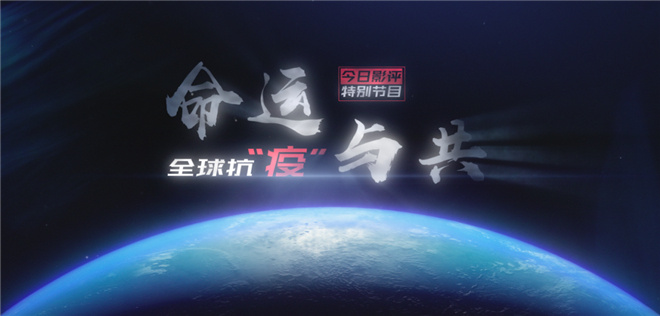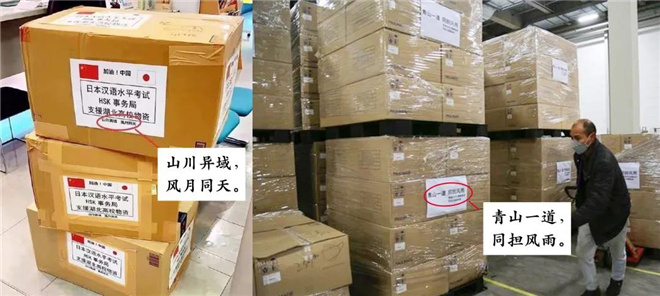
1905 movie network news The mountains and rivers are exotic, and the wind and the moon are the same. This poem by Prince Nagaya of Japan, recorded in The Whole Tang Poetry, became a well-known sentence with the help of the Japanese people at the beginning of the war to prevent and control the epidemic in China.When the scale of the epidemic in Japan continues to expand, the Chinese sons and daughters who reciprocate are also giving back epidemic prevention materials.useWang ChangAge poems to friendly neighbors to "green hillsTogether, withBear the wind and rain. "

There are no isolated islands under the great epidemic.The responsibility and responsibility of the community of human destiny make it impossible for us to be indifferent to the dangers of our neighbors. The valuable epidemic prevention experience gained by China society with wisdom and sacrifice has not been missed by foreign friends and neighbors.threemoonA short film "Ba Ping", which truly recorded the "miracle" of Nanjing’s anti-epidemic, triggered a national-level heated discussion. In the Qingming Festival, this documentary called "Nanjing Anti-epidemic Scene" released the second one.
It was Japanese director Takeuchi who appeared to explain and direct this documentary. In 2013, his family moved to his wife’s hometown — — Nanjing, through the unremitting shooting of documentary works such as "The reason why I live here", has gradually broadened the image mode of Sino-Japanese folk cultural exchange.
Upon hearing the invitation of the special program "Today’s Film Critics, Destiny and Communion", director Takeuchi Ryo readily joined the connection and shared his special feelings as a Japanese filmmaker in China.
Today’s Film Critics, Destiny and Communion — — Japanese article
Lands apart, sky shared.
Japanese living in Nanjing. This is the introduction of the habit of bright inside bamboo. The recognition of Nanjing, his second hometown, is reflected in his daily shooting images.When the epidemic situation in China and Japan changed, the "miracle" of zero infection in Nanjing for several days in a row made him have the idea of recording and promoting it in Japan. As a result, Nanjing Anti-epidemic Scene, which was regarded as an "epidemic prevention textbook" by some Japanese people, was born.
"I think China’s anti-epidemic measures are quick and thorough, and then United." The "fast" construction of Fangcang Hospital, the "thorough" implementation of blocking measures such as suspension of work and school, and the "unity" of China people’s efforts to help each other and fight the virus have brought him shock and emotion in different dimensions.The Nanjing Anti-epidemic Scene, which condensed these experiences and feelings, triggered a strong response from Japanese netizens.
"More than 90% of the comments are positive energy." After the short film was broadcast, Takeuchi received many compatriots’ praise and even "envy" for China’s epidemic prevention measures, and some Chinese in Japan also sent him thanks. "Because they were really helpless, (I don’t know) how to convey the real China (epidemic prevention) status to the Japanese around them. Now they all use my video to show their colleagues. It turned out that it was so strict that China controlled the virus.
In the second part of "Nanjing Anti-epidemic Scene" released by Tomb-Sweeping Day, Takeuchi Ryo compares the busy street scene with the empty space in the previous work, and shows the epidemic prevention achievements of China to Japan and the whole world through the representative images of Nanjing.
Nowadays, Nanjing Anti-epidemic Scene has been translated into Chinese, Japanese, English, Italian and other languages, which has become a channel for more and more overseas friends to observe and learn from China’s experience. "The national conditions are different, (Nanjing epidemic prevention measures) can’t be imitated," a few doubts didn’t put pressure on Takeuchi. "But there are many places to learn, and we should also learn."
Castle peak, bear the wind and rain together.
When the epidemic strikes, it is not just the Tokyo Olympic Games that have been decided to postpone."NHK TV station is facing a great influence now," said Takeuchi, a TV station that broadcast Nanjing Anti-epidemic Scene, which deeply realized the helplessness of his TV colleagues. "They prepared a lot of programs about the Olympic Games, but the Olympic Games were postponed, and all of them were gone. Everyone was very confused about what the programs should be shown now."
On the eve of the Spring Festival, Takeuchi Ryo had cooperated with movies. "We had a special program to introduce Japanese stars, and then interviewed Japanese actors in Detective Chinatown 3. This interview has been broadcast, but I didn’t expect the film to be postponed."Similar to what happened to Detective Chinatown 3, many Japanese films to be shown have also cancelled their release plans. Originally scheduled to be released in Japan on March 6It is one of the first works to announce the withdrawal of files.
For Japanese film practitioners, even if they try their best to fight against the epidemic situation, there are still many regrets.
The 15th Osaka Asian Film Festival, which was held as scheduled from March 6th to March 15th, put all the staff under great pressure. "This film festival also bears social responsibility. If it is postponed to summer, the same project can’t be completed quickly at that time," said Hui Jun Chuangsan, the general planner of the film festival. "But there are still many parts that can’t be carried out as usual. The most regrettable thing is that there is no question and answer session and many guests can’t come."
However, the friendship and mutual assistance between China and Japan under the epidemic situation has enabled Takeuchi, as an observer, to see the future of deepening cooperation."With the help of donating masks to each other in this epidemic, Sino-Japanese relations are getting better and better, so after the epidemic, I can say with certainty that there will be more and more films co-produced by China and Japan."
After In Spring, the famous director Shunji Iwai once again connected with the special program Destiny and Common Destiny of Today’s Film Review. For director Takeuchi Ryo’s hope of seeing cultural cooperation from the deepening of Sino-Japanese friendly relations, he agreed with him and also sent his blessing.
Shunji Iwai:Nowadays, Covid-19 is raging all over the world, and many people are fighting for it. Many people have lost their precious lives because of this, which has also brought a serious impact on our lives. Although the current situation is grim, we can overcome the difficulties and the future is still foreseeable. This difficult day will continue for some time, let’s cheer together to tide over the difficulties! Please pay attention to your health, I also want to refuel!
关于作者